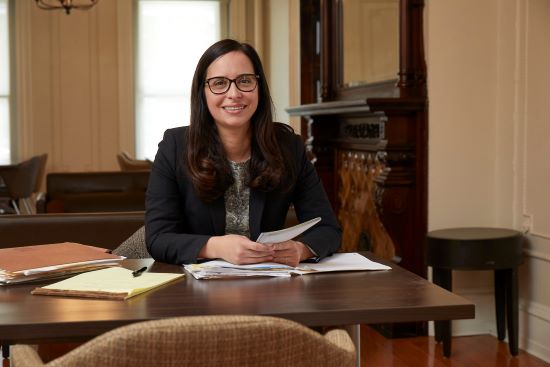All Humans Have a Legal Right to Redemption
Scholarship by Professor Rachel E. López

In the article “Redeeming Justice,” Professor Rachel E. López and her two co-authors, human rights activists Terrell Carter and Kempis “Ghani” Songster, argue that all humans have a legal right to redemption and that U.S. life sentences without parole (LWOP) are a violation of that right.
The article appeared in the Northwestern University Law Review and received the 2022 Law and Society Association Article Prize.
“Redeeming Justice” addresses the legal right to redemption on a personal level, as co-authors Carter and Songster both received LWOP, which they describe in the article as death by incarceration (DBI).
Songster was sentenced to LWOP as a juvenile and served 30 years in prison before being resentenced and released pursuant to the Supreme Court’s decision in Miller v. Alabama. Songster is now the program director at Healing Futures Restorative Justice Diversion Program.
Carter served 29 years of an LWOP prison sentence before being granted clemency from Gov. Tom Wolf in July 2022.
López directs the law school’s Andy and Gwen Stern Community Lawyering Clinic, which was instrumental in pushing for Carter’s release.
The authors assert that the legal right to redemption is embedded in the Eighth Amendment through the concept of human dignity and that in line with human rights law, all prison sentences should be reviewable and release should be possible on the basis of rehabilitation.
“The reading of the Eighth Amendment we call for would require a dramatic reimagination of the U.S. criminal legal system into one that elevates humanity, not deprives it,” the article says. “One that creates the opportunity for healing and human development, not denies it. One that facilitates the human capacity for redemption, not forbids it. One, in other words, that recognizes that change is always possible.”
In 2011 Carter and Songster helped found the Right to Redemption (R2R) Committee at Graterford, one of Pennsylvania’s largest prisons.
The R2R Committee shared the unspoken truth that if nothing changed, “we would all have to face the bleak reality of dying alone in prison, without ever having the opportunity to try to make up for the harm that we caused,” so the group committed to “do whatever we could to help bring about an end to the inhuman practice of sentencing human beings to DBI.”
The group found that the first step was to change the language around how they were described, no longer referring to themselves as “convicts,” “lifers,” “prisoners,” “inmates,” or any other label that denied their humanity.
The article includes a state-by-state review of clemency, one possible mechanism of release for those serving life without parole, concluding that it is not available in many states or is a mostly opaque, arbitrary process in others.
López cites international laws that dovetail with the human right to redemption. The Council of Europe first denounced DBI over forty years ago, when it commissioned a study that concluded that “it is inhuman to imprison a person for life without the hope of release.”
The European Court of Human Rights’ landmark case, Vinter v. United Kingdom, also concluded that “all prisoners, including those serving life sentences, [must] be offered the possibility of rehabilitation and the prospect of release if that rehabilitation is achieved.”
Nearly all Latin American countries take a rehabilitative approach to punishment, while numerous jurisdictions in Africa have found LWOP cruel and unusual. The global trend emphasizing rehabilitation is significant and raises questions for the U.S. legal system.
“The fact that the United States is one of the rare countries that employs LWOP—with no escape valve whatsoever—should raise considerable concerns about its habitual use,” the article states.
The authors then conclude with the idea that redemptive justice can have far-reaching effects that foster human dignity, development, healing and hope.